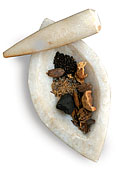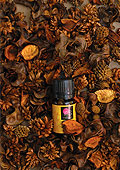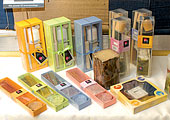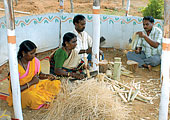|
The
royal city of Mysore-so called because of its numerous palaces,
mostly built by the Wodeyars-has, in the last couple of decades,
lived in the shadow of Bangalore. But before the it industry put
the latter on the global map and turned it into a brand and a
pejorative verb (getting Bangalored), it was Mysore that was more
famous; think yoga, silk, sandalwood and incense. Yes, incense.
Most of the agarbathis that people burn before portraits and idols
of gods and goddesses come from here-and even those that don't,
have "Made in Mysore" stamped on them. "The incense
industry in India has come a long way but is growing at a pace
of just 3-4 per cent. And the fragrances we produce provide the
base for several related industries," says R. Guru, Chairman,
of the Rs 325-crore N. Ranga Rao & Sons, the largest player
in the Rs 1,200-crore industry.
The production of agarbathis is no rocket
science, admits Arjun M. Ranga, Managing Partner and a third generation
scion of the nr Group. Entry barriers are low and the business
is trade-driven. But it was one man, Narayana Ranga Rao, the founder
of this group, who modernised this low-tech, manpower-intensive
industry and put it on the global map. His company now has a 40
per cent global market share in tuberose (rajnigandha) extracts
and a 30 per cent share in jasmine extracts.
The creation of a fragrance is part art and
part science, says Kiran Ranga, Arjun's cousin and a partner in
the business, who has taken a four-year perfumery course from
the University of Plymouth, London. Unlike in the West, which
uses a number of synthetic chemicals, Indian players like the
nr Group are known for their use of natural materials. Kiran says
that to get the smell of jasmine on to an incense stick is actually
a difficult task. "There are 60 different chemicals which
finally give us the olefactory feeling of having smelt a jasmine.
Recreating that in the lab either through solvent extraction or
other methods is a complex process. That is our key strength."
|

|
|
Several herbal substances are
mixed to get the right fragrance
|
There are more than 5,000 synthetic and natural
compounds available that help perfumers create various fragrances.
Says Arjun: "Our fragrances are used not just in incense
sticks, but in everything from high-end perfumes, deodorants,
eau de toilettes, to more humble things like bars of soap and
toilet cleaning liquids." Internationally, there are just
6-8 major players, called flavour and fragrance houses-to whom
nr Group sells its floral extracts-that control the $15-billion
(Rs 64,500 crore)-plus market for fragrances. All perfumers buy
the basic blends from f&f houses like Givaudan, Quest International
and iff and then brand and market them.
Traditionally, consumers in the West have
favoured fragrances like lavender and rosemary. Kiran claims that
the nr Group convinced these F&F houses to include Gundu Malle
(scientific name: Jasmine Sambac), tuberose (Polianthes Tuberosa),
Mimosa, white and pink lotus and even fragrances extracted from
coffee beans in their basket. Jasmine extracts sell for $3,500
(Rs 1,50,500) per kg. These F&F houses then create "blends"
that they sell to the likes of Christian Dior, Calvin Klein and
others. "We are experimenting with a number of new fragrances.
Since our focus is on natural products, the condition of the soil
and the use of pesticides and fertilisers have a major impact.
In order to have control over the quality of flowers that go into
our products, we have entered into contract farming arrangements
with more than 800 farmers in and around Mysore and Munnar,"
says Kiran. In the domestic market, the company supplies floral
extracts to players like Himalaya Drugs, CavinKare and Dabur,
while globally, it supplies to the likes of Givudan, IFF and Quest,
among others.
|

|
|

|
|
Floral extracts find use in various
products-from agarbathis to perfumes and toiletries
|
Incidentally, these fragrances are a closely
guarded family secret, known only to five senior family members
at any point in time (a la the Coke formula), and is a trade secret
that is passed down from one generation to the next.
But the bread and butter of the group remains
incense sticks and it is this market that it really dominates.
Its Cycle brand agarbathi is easily the leader in a market where
ITC is the only other large player. Earlier attempts by Hindustan
Lever (now Hindustan Unilever) and Reckitt and Benckiser to enter
the market ended in failure and both have now largely withdrawn
from it. The Rangas are confident that they can beat off the challenge
from the cigarettes-to-hotels conglomerate as well. Says Arjun:
"We hold ITC in the highest esteem, but this is a tough market
to crack." What gives him confidence is that the business
is a high volume, low value, low margin one. "My most expensive
incense stick sells for Rs 2.50 and the cheapest for just 30 paise.
We have 600 sales personnel, 3,000 distribtuors and reach 300,000
retail outlets," he adds.
That, however, hasn't stopped a number of
other players like Nirma, Gopal Zarda, mdh Masala Group and Jyothy
Laboratories (of Ujala fame) from trying. They have launched their
own brands recently, says Arjun Ranga.
Meanwhile, the group is building on its expertise
in fragrances. It has floated a company called Ripple Fragrances
that has launched deodorants and perfumes under the DNA brand
name. Arjun admits that while the group has proven product development
expertise, the distribution and logistics chain for personal care
products is a different ball game altogether. "We are in
the process of putting it in place," he says.
It won't be easy as, logistics apart, it
will have to fight the HULs and the Godrejs on their home turf.
But it will have to make the effort and climb that next step up
the value chain. And the Rangas are hoping that the scent of success
will remain as sweet as it is at present.
THE ANATOMY OF AN INCENSE STICK
 Incense
sticks are made of a thin sliced bamboo reed (the stick) on which
is rolled a dough (made of charcoal and the powdered bark of the
Lauraceae tree), which when lit, gives out a pleasant scent. Neither
the bamboo reed nor the dough have any kind of inherent fragrance.
Called "neutral" bathis in industry parlance, these
sticks are dipped into various fragrances to create various types
of agarbathis. Sometimes, though, the fragrance is added to the
dough before it is rolled on to the bamboo sticks, creating what
are called masalabathis. Women are mainly employed for rolling
agarbathis. Companies such as NR Group supply sliced bamboo sticks
and the dough to several low-income households in and around Mysore
and collect the finished product later. On an average, a woman
can roll around 3,000 bathis a day and earn Rs 60 in return. More
than 20,000 women are estimated to be rolling bathis in Mysore. Incense
sticks are made of a thin sliced bamboo reed (the stick) on which
is rolled a dough (made of charcoal and the powdered bark of the
Lauraceae tree), which when lit, gives out a pleasant scent. Neither
the bamboo reed nor the dough have any kind of inherent fragrance.
Called "neutral" bathis in industry parlance, these
sticks are dipped into various fragrances to create various types
of agarbathis. Sometimes, though, the fragrance is added to the
dough before it is rolled on to the bamboo sticks, creating what
are called masalabathis. Women are mainly employed for rolling
agarbathis. Companies such as NR Group supply sliced bamboo sticks
and the dough to several low-income households in and around Mysore
and collect the finished product later. On an average, a woman
can roll around 3,000 bathis a day and earn Rs 60 in return. More
than 20,000 women are estimated to be rolling bathis in Mysore.
|










 Incense
sticks are made of a thin sliced bamboo reed (the stick) on which
is rolled a dough (made of charcoal and the powdered bark of the
Lauraceae tree), which when lit, gives out a pleasant scent. Neither
the bamboo reed nor the dough have any kind of inherent fragrance.
Called "neutral" bathis in industry parlance, these
sticks are dipped into various fragrances to create various types
of agarbathis. Sometimes, though, the fragrance is added to the
dough before it is rolled on to the bamboo sticks, creating what
are called masalabathis. Women are mainly employed for rolling
agarbathis. Companies such as NR Group supply sliced bamboo sticks
and the dough to several low-income households in and around Mysore
and collect the finished product later. On an average, a woman
can roll around 3,000 bathis a day and earn Rs 60 in return. More
than 20,000 women are estimated to be rolling bathis in Mysore.
Incense
sticks are made of a thin sliced bamboo reed (the stick) on which
is rolled a dough (made of charcoal and the powdered bark of the
Lauraceae tree), which when lit, gives out a pleasant scent. Neither
the bamboo reed nor the dough have any kind of inherent fragrance.
Called "neutral" bathis in industry parlance, these
sticks are dipped into various fragrances to create various types
of agarbathis. Sometimes, though, the fragrance is added to the
dough before it is rolled on to the bamboo sticks, creating what
are called masalabathis. Women are mainly employed for rolling
agarbathis. Companies such as NR Group supply sliced bamboo sticks
and the dough to several low-income households in and around Mysore
and collect the finished product later. On an average, a woman
can roll around 3,000 bathis a day and earn Rs 60 in return. More
than 20,000 women are estimated to be rolling bathis in Mysore.